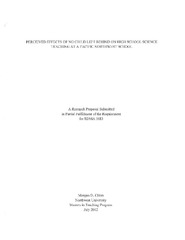| dc.description.abstract | This project examines the effects No Child Left Behind has on high school science instruction at a Pacific Northwest high school, with a focus on whether students perceive a reduction in science curriculum in the science classroom in favor of assessed subjects, such as math and reading. A qualitative research methodology was used, surveying 40 random students in both biology and environmental science classes at the high school, the results of which were analyzed using item analysis, identifying common themes and responses. The students were grouped into three broad categories based on responses, and it was found that a majority of the students (67.5%) surveyed did not see a change in science instruction, while a minority of students (27.5%) viewed a decrease in science curriculum, and an even smaller minority (5%) thought that time dedicated to science had increased. In light of the results, future research is proposed focusing more broadly on whether NCLB is meeting its goal of equal education for all and how to improve science education in the future. Ultimately, students overall did not view there to be a change in the time spent on science instruction in the science classroom at the Pacific Northwest high school, and a change in attitude towards to NCLB policy is offered. | en |


 Maintained by the Northwest University Library
Maintained by the Northwest University Library